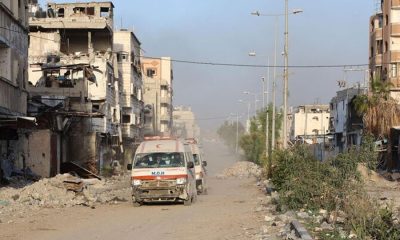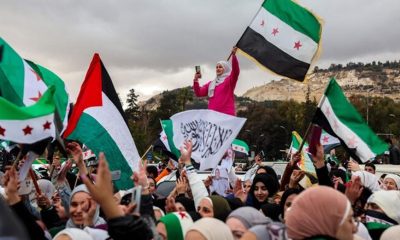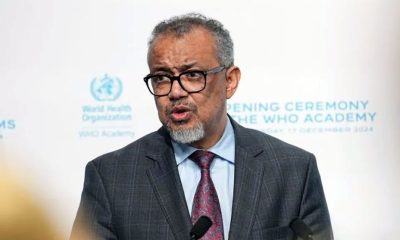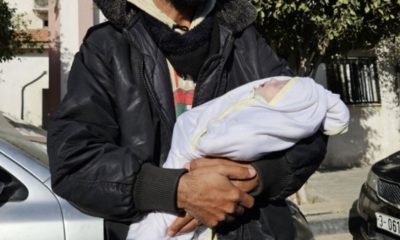International
Israel attacks southern Lebanon as Hezbollah launches rockets
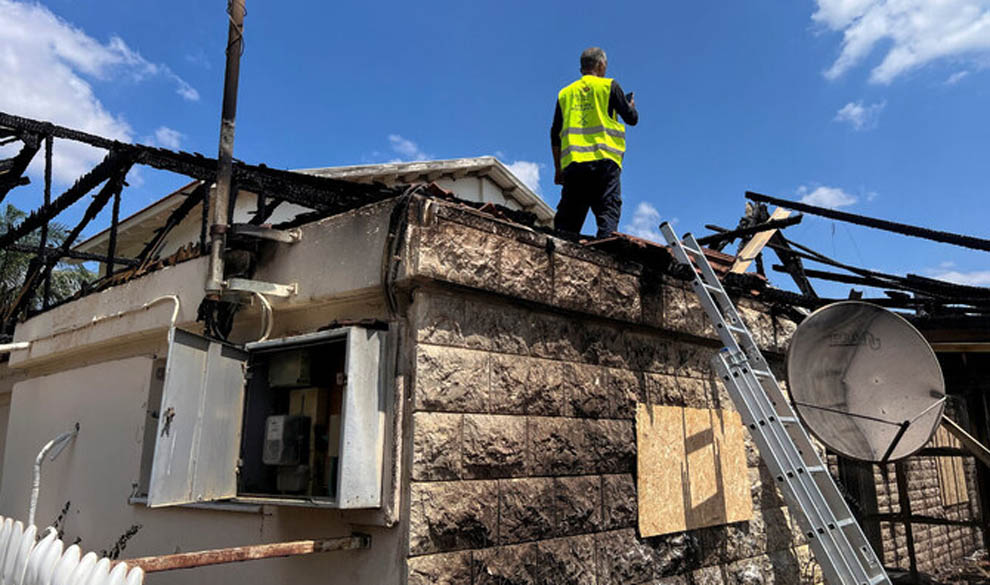
Israel attacks southern Lebanon as Hezbollah launches rockets
Hezbollah says it has completed the first phase of a retaliatory attack on Israel with “a large number of missiles” in response to the killing of commander Fuad Shukr at the end of July.
The Lebanese group said in a statement on Sunday that it fired more than 320 Katyusha rockets at 11 Israeli military bases and barracks, including the Meron base and four sites in the occupied Golan Heights.
The response was a hotly anticipated one, weeks in the making against Israel’s targeted killings of senior commanders of Hezbollah and Hamas, mounting concern of regional escalation.
Hezbollah said it targeted military bases to “facilitate the passage of drones” towards their desired targets deep inside Israel. “And the drones have passed as planned.”
This comes as Israel launched a series of intense air raids on southern Lebanon early on Sunday in what it said was a “preemptive” attack launched when Hezbollah’s preparation to attack northern Israel was detected.
“Most of the Israeli strikes on Lebanon were in the border area, up to 5km [3 miles] deep along the 120km [74-mile] border,” said Al Jazeera’s Zeina Khodr, reporting from Lebanese town Marjayoun.
“The border area is now a military zone. It’s been evacuated … It’s been repeatedly hit by the Israeli army in recent months.”
While Hezbollah and Israel have been exchanging tit-for-tat attacks across the border with some intensity since the start of Israel’s war on Gaza in October, this marks a significant escalation.
A resident of the southern Lebanese town of Zibqin, some 7km (4 miles) from the border, told the Reuters news agency it was the first time he had awakened “to the sound of planes and the loud explosions of rockets – even before the dawn prayer. It felt like the apocalypse.”
Lebanon’s NNA news agency reported one person was critically injured in a drone attack in Qasimia and a later Israeli air attack killed one person in the town of Khiam.
READ ALSO:
- CNG: FG partners four firms in Ogun to begin vehicle conversion
- Nnamdi Kanu must be released unconditionally – Igbo elders insist
- Why I’m not an ex-convict – Bobrisky
‘Special situation’
Israel’s Defence Minister Yoav Gallant declared a “special situation” and announced a 48-hour nationwide state of emergency from 6am (03:00 GMT) on Sunday.
Israel’s Ben Gurion airport was temporarily closed in the early hours of the morning, while reports emerged of some injuries in northern Israel. The Israeli army also announced a series of restrictions on civilians in northern Israel and the Golan Heights, including the closure of some beaches.
Israel’s Army Radio, citing defence officials, said the military assessed that Hezbollah had been preparing to fire hundreds of missiles into central Israel in an attack planned for 5am.
About 100 Israeli jets then foiled the missile strikes, beginning their attack half an hour beforehand, the report said, adding that the military assessed the subsequent Hezbollah barrage was “improvised”.
Prime Minister Benjamin Netanyahu said Israel was “determined to do everything possible to defend” itself. “Whoever harms us – we harm him,” he said in a statement.
Following the attacks, Al Jazeera’s Khodr said: “There are reports that this initial wave of attacks in southern Lebanon has now ended, so we’re waiting to hear from the Israeli military to see whether or not they plan to carry out more strikes, which could, in turn, trigger a Hezbollah response and expand this conflict.
“This is, and has been, a very dangerous conflict, even though largely contained, there is a real concern that it could expand and spiral out of control.”
READ ALSO:
- UPDATED: Why I resigned as NIA DG, by Abubakar
- 27-year-old Anambra man attempts suicide over N1.2m debt
- Six persons arrested for urinating on Lagos rail track
‘Trying to avoid full-blown war’
The Israeli military said most of its attacks against Hezbollah were in southern Lebanon for now, but it will strike anywhere where there is a threat.
Global concern that Israel’s war will escalate into an all-out regional conflict multiplied after the assassination last month of Hamas political chief Ismail Haniyeh in Tehran and of Shukr in Beirut, both blamed on Israel.
Israel’s attacks have “the potential to draw the whole region into the full-blown war”, Sami Nader, the director of the Levant Institute for Strategic Affairs, told Al Jazeera.
He said while this signals a “major escalation in terms of scope of operation and intensity”, both Hezbollah and Israel “are trying to avoid full-blown war”.
Israel, he said, is “exhausted” by its war on Gaza, and the Lebanese group does not want to see a war similar to the one that occurred in 2006 as Lebanon is in a “serious economic crisis”.
Meanwhile, the United States said on Sunday it would “keep supporting Israel’s right to defend itself”.
At President Joe Biden’s direction, “senior US officials have been communicating continuously with their Israeli counterparts”, US National Security Council spokesman Sean Savett said in a statement.
Sunday’s attack came as Egypt hosted a new round of talks aimed at ending Israel’s war on Gaza, now in its 11th month. Hezbollah has said it will halt the fighting if there is a ceasefire.
No diplomatic settlement, however, appears to be taking form and “Israel is determined to change rules of engagement” that would allow a return of all Israelis who were evacuated from northern Israel, said Nader.
Israel attacks southern Lebanon as Hezbollah launches rockets
Source: Al Jazeera and news agencies
International
UK visa: British govt raises financial requirements for students, workers

UK visa: British govt raises financial requirements for students, workers
International students and skilled workers applying for visas to the United Kingdom will face higher financial requirements beginning January 2, 2025.
These changes, announced by the UK government, require applicants to show more money in their bank accounts to cover living expenses during their stay.
These updated regulations affect those hoping to study or work in the UK, with new financial thresholds set for students and skilled workers.
These changes are aimed at ensuring that applicants have the necessary financial resources to support themselves during their time in the UK.
Increased financial requirements for students
International students seeking a UK study visa will now need to show higher amounts of money to cover their living expenses. For students attending courses in London, the required amount is £1,483 per month, while students studying outside London will need to show £1,136 per month, TravelBiz reports.
READ ALSO:
- EFCC will bring down towers of corruption this year – Olukoyede
- Two online scammers arrested in Rivers for defrauding woman of N110m
- I stand by my comments – Bauchi gov replies Presidency
For a typical one-year master’s program, students must show £13,347 if studying in London, and £10,224 for those outside London. The funds must be held in the applicant’s bank account for at least 28 consecutive days before submitting the visa application.
Comparison with current financial requirements
According to reports, currently, the financial requirements are lower. For students in London, the monthly amount is £1,334, while those studying outside London need to show £1,023 per month. Under the new rules, these amounts will increase, placing additional financial burdens on prospective students.
Changes to skilled worker visa financial requirements
Skilled workers applying for a visa to the UK will also face new financial thresholds. According to reports, to qualify for a skilled worker visa, applicants must have an annual income of at least £38,700 to cover living expenses and accommodation. In addition, applicants must secure sponsorship from an employer approved by the Home Office.
Like student applicants, skilled worker visa applicants must demonstrate that they have the required funds in their account for at least 28 consecutive days before submitting their application if they do not have employer sponsorship.
Updated UK visa fees and exemptions
Visa application fees for 2025 have been revised to reflect inflation and improved services. The new fees for various visa categories are as follows:
- Short-term Visit (6 months): $153
- Long-term Visit (2 years): $573
- Long-term Visit (5 years): $1,023
- Long-term Visit (10 years): $1,277
- Skilled Worker Visa: $827
- Student Visa (Outside UK): $647
- Parent of Student Child Visa: $845
Priority visas are priced at $550, while super-priority visas cost $1,050. However, certain groups such as individuals with disabilities, carers, and professionals in specific sectors like healthcare, the armed forces, and talent-based roles will continue to benefit from fee waivers.
The 28-day rule for financial documentation
A key new regulation is the “28-day rule”. Applicants must ensure that the required funds remain in their bank account for at least 28 consecutive days, without dipping below the required amount.
Bank statements or certified letters submitted as part of the financial documentation must show that the closing balance is no older than 30 days when the visa application is submitted. Failure to comply with this rule may result in visa rejection
UK visa: British govt raises financial requirements for students, workers
International
Moscow attacks Ukraine with drones, missiles
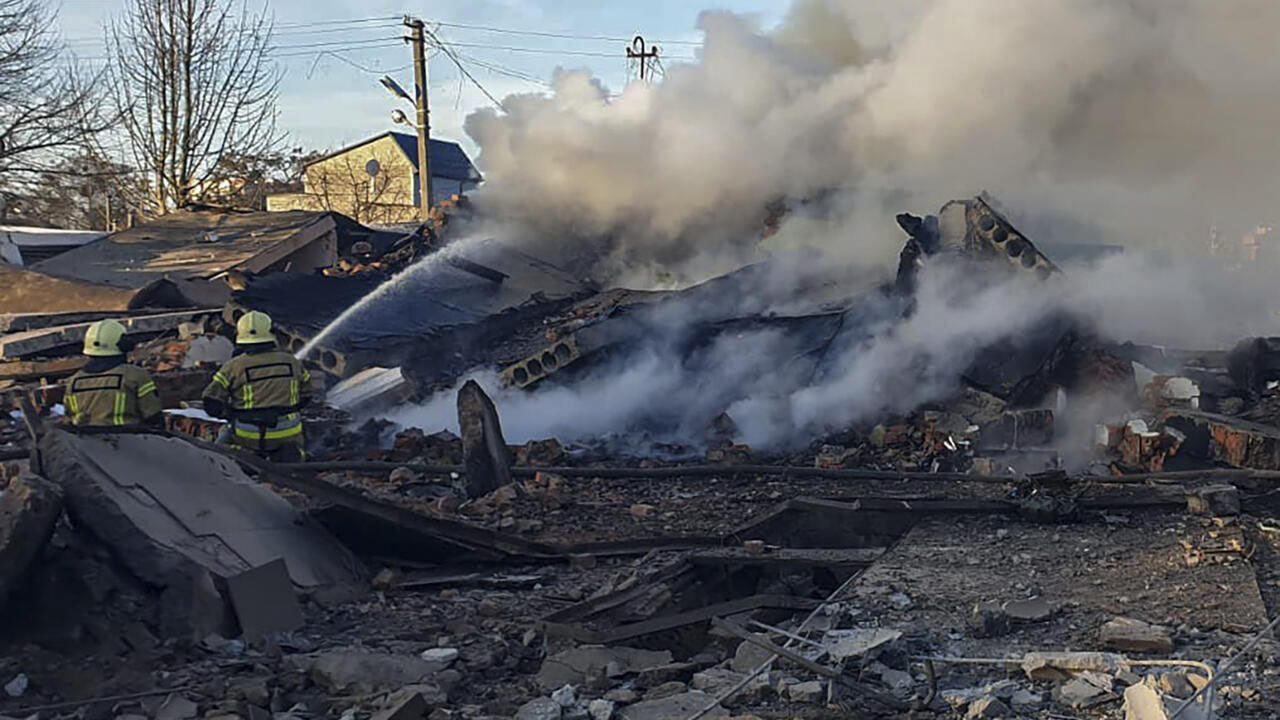
Moscow attacks Ukraine with drones, missiles
Kyiv said Tuesday that Russia had launched a barrage of drones and missiles across Ukraine, conceding that there were successful strikes in the east of the country and near the capital.
Authorities did not elaborate on what had been hit but in the wider Kyiv region, the governor said debris from a downed projectile had damaged a private home and wounded a woman.
Moscow said its forces had used attack drones and precision weapons in a “combined” assault on a military airfield and a munitions production facility, claiming that the targets were struck.
READ ALSO:
- Wanted terrorist commander, Bello Turji, a dead man walking – DHQ
- Court orders forfeiture of $49,700 linked to former INEC official
- DSS arrests activist Shehu Mahdi over post on French military base
The Ukrainian air force said Russia had launched 21 missiles of various types and 40 drones in the barrage, adding that seven missiles and 16 unmanned aerial vehicles were downed.
“As a result of the Russian attack, there were ballistic missile hits in Sumy and Kyiv regions,” the air force said.
Russia has launched aerial attacks on Ukraine at night almost every day since its forces invaded in February 2022, targeting military and civilian infrastructure, too, like energy facilities.
Ukraine has stepped up its own drone and missile attacks inside Russian territory in response, and urged its Western allies to supply more air defence systems.
A Ukrainian drone attack in western Russia caused a fuel spill and fire at an oil depot, a Russian regional governor said earlier Tuesday.
Moscow attacks Ukraine with drones, missiles
International
Catholic priest sentenced to 11 years for criticising his president
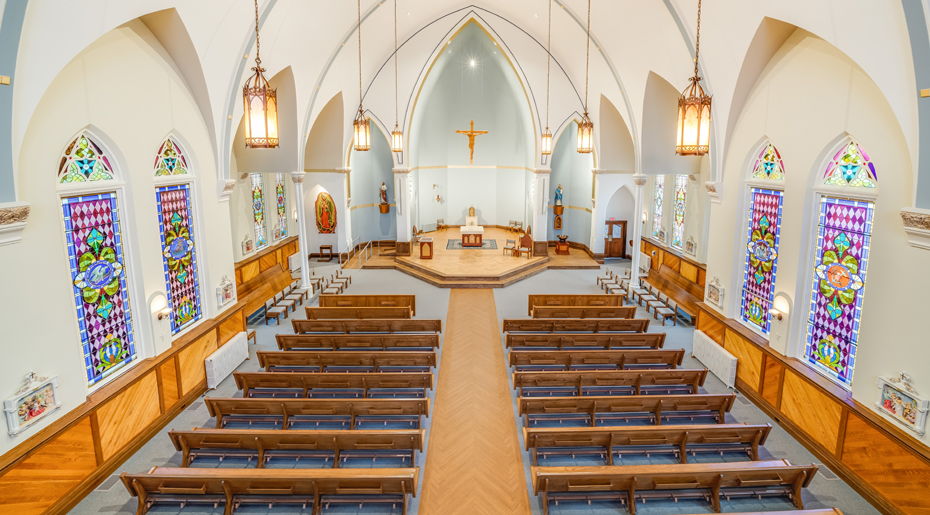
Catholic priest sentenced to 11 years for criticising his president
A Catholic priest in Belarus on Monday was convicted on charges of high treason for criticising the government and handed an 11-year sentence, in the first case of politically-driven charges against Catholic clergy since Belarus became independent after the Soviet Union collapsed in 1991.
The conviction and sentencing of Rev. Henrykh Akalatovich comes as Belarusian authorities have intensified their sweeping crackdown on dissent ahead of the Jan. 26 presidential election that is all but certain to hand authoritarian President Alexander Lukashenko a seventh term in office.
The Viasna Human Rights Centre said Akalatovich, 64, rejected the treason charges. The group has listed him among 1,265 political prisoners in the country.
“For the first time since the fall of the Communist regime, a Catholic priest in Belarus was convicted on criminal charges that are levelled against political prisoners,” said Viasna’s representative Pavel Sapelka. “The harsh sentence is intended to intimidate and silence hundreds of other priests ahead of January’s presidential election.”
Akalatovich, who has been in custody since November 2023, was diagnosed with cancer and underwent surgery just before his arrest. The priest from the town of Valozhyn in western Belarus, who was critical of the government in his sermons, has been held incommunicado, with prison officials turning down warm clothing and food sent to him.
Arkatovich is among dozens of clergy — Catholic, Orthodox and Protestant — who have been jailed, silenced or forced into exile for protesting the 2020 election that gave Lukashenko a sixth term. The disputed vote that the opposition and the West said was marred with fraud triggered mass protests,. The authorities then responded with a sweeping crackdown that saw more than 65,000 arrested and thousands beaten by police.
Catholic and Protestant clergy who supported the protests and sheltered demonstrators at their churches were particularly targeted by repressions. Belarusian authorities openly seek to bring the clergy into line, repeatedly summoning them for “preventive” political talks, checking websites and social media, and having security services monitor sermons.
While Orthodox Christians make up about 80% of the population, just under 14% are Catholic and 2% are Protestants.
Lukashenko, who has ruled Belarus for nearly 30 years and describes himself as an “Orthodox atheist,” lashed out at dissident clergy during the 2020 protests, urging them to “do their jobs,” and not fuel unrest.
Lukashenko is one of Russian President Vladimir Putin’s closest allies, allowing Russia to use his country’s territory to send troops into Ukraine in February 2022 and to deploy some of its tactical nuclear weapons in Belarus.
Catholic priest sentenced to 11 years for criticising his president
-

 Politics3 days ago
Politics3 days agoGbajabiamila speaks on his rumoured Lagos governorship ambition
-

 metro3 days ago
metro3 days agoFarotimi to pursue disbarment over arrest, defamation allegations
-

 Business2 days ago
Business2 days agoReal reason Dangote, NNPC drop petrol price — IPMAN
-

 Health2 days ago
Health2 days agoABU Teaching Hospital will begin kidney transplant in 2025 – CMD
-

 Sports1 day ago
Sports1 day agoAnthony Joshua prostrates before Governor Abiodun during Ogun visit
-

 metro3 days ago
metro3 days agoEl-Rufai accuses Tinubu govt of Yoruba agenda, Reno Omokri reacts
-

 metro3 days ago
metro3 days agoNigerian govt urged to intervene in Mozambique post-election violence
-

 metro1 day ago
metro1 day agoN180m not missing from my account, it was all a plan – Verydarkman

